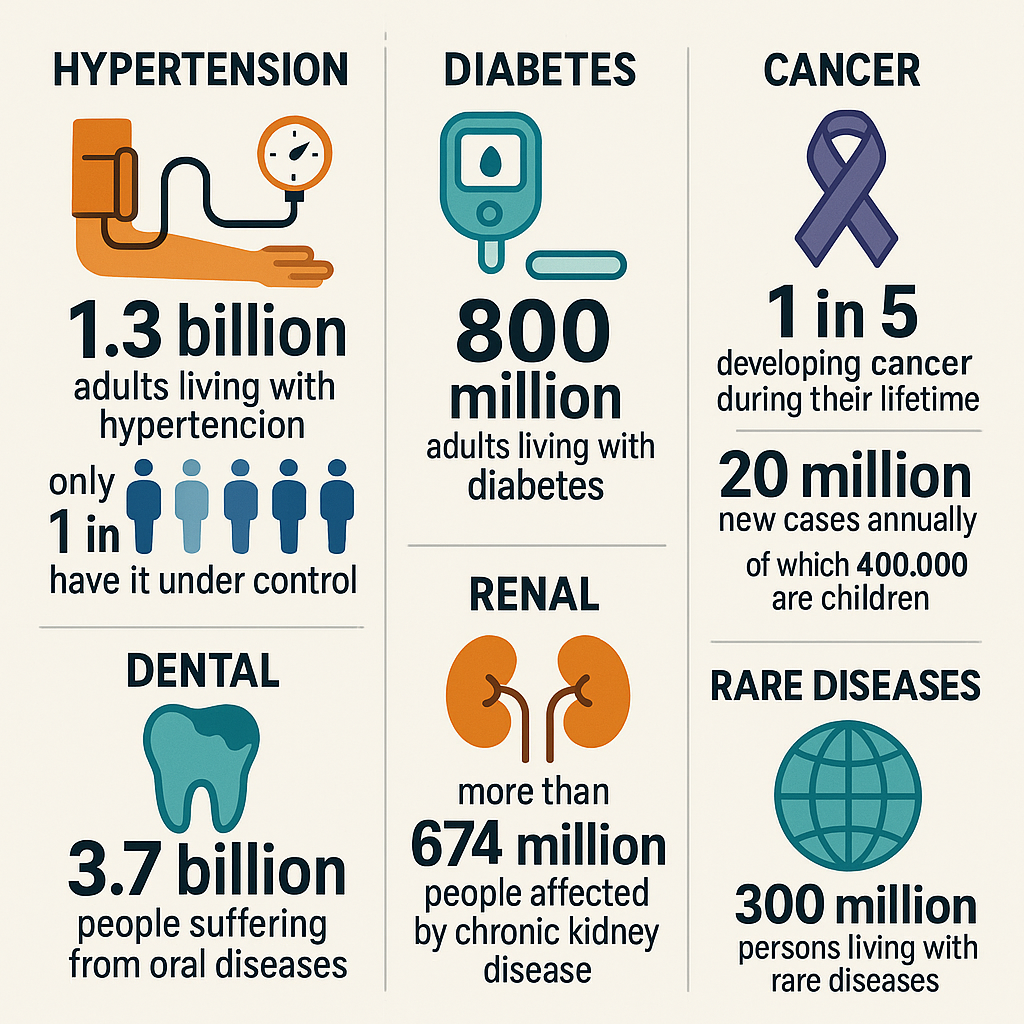UN Declaration on NCDs is strong on ambition, but short of means
The UN declaration on noncommunicable diseases and mental health receives broad support, but critics say the content is weak

Heads of state and ministers of health gathering at the United Nations General Assembly this week expressed broad support for a new political declaration on noncommunicable diseases (NCDs) and mental health, set for adoption in October.
The declaration outlines headline goals for 2030: 150 million fewer tobacco users, 150 million more people with controlled hypertension, and 150 million more with access to mental health care. But while the targets are ambitious, the final draft falls short of its initial aspirations, after key measures were softened during negotiations.
Vague commitments on modifiable risks
The original draft called for at least 80% of countries to implement World Health Organization–recommended excise taxes on tobacco, alcohol, and sugar-sweetened beverages by 2030. In the latest version, this was replaced by a looser pledge to adopt “policies and legislative, regulatory and fiscal measures to support health objectives [...] in line with national circumstances”.
Public health advocates say the dilution undermines the declaration’s credibility. “Unfortunately, industry influence held this back,” said WHO Chief Scientist Jeremy Farrar at a fringe event. “This is precisely where governments – alongside civil society – have a critical role to play.”
Similar watering down appears throughout the text. A proposed ban on alcohol advertising became a call to “consider” marketing restrictions. A push to eliminate industrial trans-fats was softened to reducing their use “to the lowest level possible”. Tobacco advertising, too, was rephrased from “eliminating” to merely “restricting.” One notable expansion was the inclusion of “nicotine packages” alongside traditional tobacco products.
Civil society voices marginalized
For civil society groups, another disappointment was their diminished role in the final draft. “There’s only one mention of civil society, when previously it was embedded throughout,” said Rosana Lescrauwaet of the Dutch Global Health Alliance. “People living with NCDs and mental health conditions are not just recipients of policies — they are experts in shaping them. Their exclusion reflects the shrinking civil space we see globally.”
A global health crisis with little funding
Noncommunicable diseases such as cancer, diabetes, and heart disease now account for 75% of deaths worldwide. Yet, according to UK-based Action for Global Health, only 1–2% of global health aid is directed to them.
“The mismatch between burden and investment is starker than ever,” the group said. It also warned that recent cuts to European aid budgets, including in the Netherlands and the UK, threaten progress. “If the UK is truly committed, it must reverse aid cuts and invest in health systems strengthening,” said Katie Husselby, the group’s director.
Advocates stress that investments in NCDs and mental health are essential for broader health security. “When a system is overwhelmed with long-term conditions like cancer and diabetes, it can’t respond to other needs — including infectious diseases,” Lescrauwaet noted.
US stands apart
The United States opposed the declaration, citing concerns over references to “gender ideology and right to abortion” as well as recommendations on taxation, though abortion is not mentioned in the text and taxation commitments were weak, seen as just one option along with regulatory measures.
US Health and Human Services Secretary Robert Kennedy acknowledged the country’s $4 trillion annual cost from chronic diseases and pointed to ultra-processed foods as a major driver, suggesting the US was prepared to lead in that area.
Bleak figures outline the challenge ahead
18 million people die prematurely each year from NCDs (before age 70).
1.3 billion tobacco users remain worldwide, causing 7 million deaths annually, including 1.6 million from second-hand smoke.
Alcohol use accounts for 2.6 million deaths annually.
Global adult obesity rates have doubled since 1990.

Despite these figures, no new funding is proposed to deliver the declaration's ambitious goals, instead the private sector is urged to make a greater contribution and organizations such as Gavi asked to step up their efforts.
Some Bright Spots
On a more positive note, the scope of the declaration was expanded to include oral health, liver and kidney diseases, lung health, and rare diseases. There was also consensus that addressing NCDs and mental health requires a whole-of-government, whole-of-society approach.
Yet for many, the real test will come after October. “What truly matters is how governments act on the Political Declaration within their own jurisdictions,” said Farrar.
